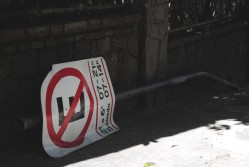
Literally every person I spoke with prior to my trip to South America last February echoed the same sentiment: South America is extremely dangerous and you’ll probably get robbed, even if you’re vigilant. In particular, I was advised to avoid visiting La Paz, Buenos Aires and São Paulo.
Incidentally, these three cities are now perhaps my favorites in South America. Guess what else? I didn’t get robbed while visiting any of them! Although I won’t attempt to discredit the popular notion that South America is a dangerous place to travel, I don’t think the threat to travelers like you and me is as dire as some would have you believe.

Signs of violent crime are all over South America.
How Dangerous is South America?
When compared to the developed world or other backpacker havens like Southeast Asia, South America can certainly be thought of as dangerous. One root of crime and danger in South America is the corrupt power structures that exist throughout much of the continent: Chile is the only country in South America where bribery is illegal.
The statistics, unfortunately, back up the assertion that South America is dangerous. In Brazil, more than 232 people per million meet their ends violently every year, as compared to 17 in Australia and just 8 in France. And you can just imagine the effect Bolivia’s recent nine per cent increase in cocaine production (which brought the country’s 2009 cocaine production total up to a staggering 113 metric tons) has had on crime there.

Of course, so too are displays of intense happiness and love.
Of course, everything is relative: You’re more likely to be killed walking through the inner cities of places like Detroit and St. Louis than you are in Lima or even Rio de Janeiro. Still, it isn’t completely inaccurate to say that South America is dangerous.
Tips for Staying Safe
Stay Inside at Night
South America is famous for its nightlife, whether you sip pisco rum in Peru, do the tango in Argentina or attend Carnaval in Brazil. When I say “stay inside” at night, I don’t necessarily mean you should stay in your hotel or hostel. Rather, stay enclosed. Don’t walk on the streets, and if you take a taxi, have the reception at your hotel or hostel call one for you.
Hang Out With Locals
Another way to enjoy nightlife in South America without putting yourself at risk is to hang out with locals. Although locals aren’t immune from crime and danger in South America, hanging around with someone who obviously has his wits about him makes you much less vulnerable a target for a would-be assailant.
Be Discreet
As a travel photographer, my heart sank when American friends who’d backpacked through Buenos Aires told me I’d be better off leaving my camera in the hostel. My local friend Marianna gave me a better suggestion: Carry a backpack. When in doubt, conceal valuable electronics and opt for the Bohemian look. In South America, diamonds are not a girl’s best friend.
Avoid Illegal Drugs
If you didn’t learn it watching South Park, I’ll remind you here: Drugs are bad, m’kay. Although it’s perfectly legal (for now) to buy and smoke marijuana in places like Amsterdam, purchasing and using weed, cocaine or any other controlled substance in South America places you not only at the mercy of maybe-violent drug dealers, but maybe result in you having to buy your way out of jail — unless, as I mentioned, you happen to be visiting Chile.

If you get robbed in South America, don’t turn to official sources for help.
What To Do If You Get Robbed in South America
If you ask most of the people I spoke with before visiting South America, I was lucky not to have been robbed when I was there. By contrast, not a single other foreign visitor I met as I traveled from Peru to Brazil mentioned anything about being robbed, at gunpoint or otherwise. I’m not a crime statistics authority, but I would venture to say that your chances of being robbed when you travel in South America are about as low as mine, provided you too keep my above suggestions in mind.
And if you do get robbed traveling in South America? Give the person everything they ask for, particularly if they flash a weapon. Unfortunately, the police probably won’t be of much help, so you should get back to your hotel or hostel as fast as possible and avoid walking wherever you were when you got robbed.
Again, this is a big “if.” Is South America dangerous? Maybe. But you don’t have to be a victim when you travel in South America.

Robert Schrader is a travel writer and photographer who’s been roaming the world independently since 2005, writing for publications such as “CNNGo” and “Shanghaiist” along the way. His blog, Leave Your Daily Hell, provides a mix of travel advice, destination guides and personal essays covering the more esoteric aspects of life as a traveler.








